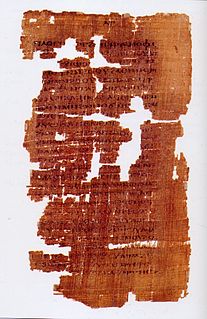In the Platonic, Neopythagorean, Middle Platonic, and Neoplatonic schools of philosophy, the demiurge is an artisan-like figure responsible for fashioning and maintaining the physical universe. The Gnostics adopted the term demiurge. Although a fashioner, the demiurge is not necessarily the same as the creator figure in the monotheistic sense, because the demiurge itself and the material from which the demiurge fashions the universe are both considered consequences of something else. Depending on the system, they may be considered either uncreated and eternal or the product of some other entity.

Gnosticism is a collection of religious ideas and systems which originated in the first century AD among early Christian and Jewish sects. These various groups emphasised personal spiritual knowledge (gnosis) over the orthodox teachings, traditions, and authority of the church. Viewing material existence as flawed or evil, Gnostic cosmogony generally presents a distinction between a supreme, hidden God and a malevolent lesser divinity who is responsible for creating the material universe. Gnostics considered the principal element of salvation to be direct knowledge of the supreme divinity in the form of mystical or esoteric insight. Many Gnostic texts deal not in concepts of sin and repentance, but with illusion and enlightenment.

Apelles of Kos was a renowned painter of ancient Greece. Pliny the Elder, to whom much of modern scholars' knowledge of this artist is owed, rated him superior to preceding and subsequent artists. He dated Apelles to the 112th Olympiad, possibly because he had produced a portrait of Alexander the Great.
Eric Voegelin was a German-American political philosopher. He was born in Cologne, and educated in political science at the University of Vienna where he became an associate professor of political science in its law faculty. In 1938 he and his wife fled from the Nazi forces which had entered Vienna. They emigrated to the United States, where they became citizens in 1944. He spent most of his academic career at Louisiana State University, the University of Munich and the Hoover Institution of Stanford University.
The Nag Hammadi library is a collection of early Christian and Gnostic texts discovered near the Upper Egyptian town of Nag Hammadi in 1945.
Valentinus is a Roman masculine given name derived from the Latin word "valens" meaning "healthy, strong". It may refer to:

Marcionism was an Early Christian dualist belief system that originated in the teachings of Marcion of Sinope in Rome around the year 144.
Valentinian may refer to:

The Gospel of Philip is one of the Gnostic Gospels, a text of New Testament apocrypha, dated to around the 3rd century but lost in medieval times until rediscovered by accident, buried with other texts near Nag Hammadi in Egypt, in 1945.

The New Testament apocrypha are a number of writings by early Christians that give accounts of Jesus and his teachings, the nature of God, or the teachings of his apostles and of their lives. Some of these writings have been cited as scripture by early Christians, but since the fifth century a widespread consensus has emerged limiting the New Testament to the 27 books of the modern canon. Roman Catholic, Eastern Orthodox, and Protestant churches generally do not view these New Testament apocrypha as part of the Bible.
Apelles was a second-century Gnostic Christian thinker. He started out his ministry as a disciple of Marcion of Sinope, probably in Rome. But at some point, Apelles either left, or was expelled from, the Marcionite church.
De Carne Christi is a polemical work by Tertullian against the Gnostic Docetism of Marcion, Apelles, Valentinus and Alexander. It purports that the body of Christ was a real human body, born from the virginal body of Mary, but not by way of human procreation. Among other justifications for the incarnation of Christ, it states that "the choice of 'foolish' flesh is part of [God's] conscious rejection of conventional wisdom" and that "Without true incarnation, there can be no true redemption... God must have flesh, in order to have a real death and real resurrection.".
Gnostic church may refer to a variety of religious organizations which identify themselves with Gnosticism. Various Gnostic religious organizations include:
Marcellina was an early Christian Carpocratian religious leader in the mid-second century AD known primarily from the writings of Irenaeus and Origen. She originated in Alexandria, but moved to Rome during the episcopate of Anicetus. She attracted large numbers of followers and founded the Carpocratian sect of Marcellians. Like other Carpocratians, Marcellina and her followers believed in antinomianism, also known as libertinism, the idea that obedience to laws and regulations is unnecessary in order to attain salvation. They believed that Jesus was only a man, but saw him as a model to be emulated, albeit one which a believer was capable of surpassing. Marcellina's community appears to have sought to literally implement the foundational Carpocratian teaching of social egalitarianism. The Marcellians in particular are reported to have branded their disciples on the insides of their right earlobes and venerated images of Jesus as well as Greek philosophers such as Pythagoras, Plato, and Aristotle. Although the Marcellians identified themselves as "gnostics", many modern scholars do not classify them as members of the sect of Gnosticism.

HMS Apelles was a Crocus-class brig-sloop of the Royal Navy. She was launched in 1808 and sold in 1816. During her service she grounded on the French coast and was in French hands for about a day before the British recaptured her. During her career she captured two French privateers.
This page is based on this
Wikipedia article Text is available under the
CC BY-SA 4.0 license; additional terms may apply.
Images, videos and audio are available under their respective licenses.




